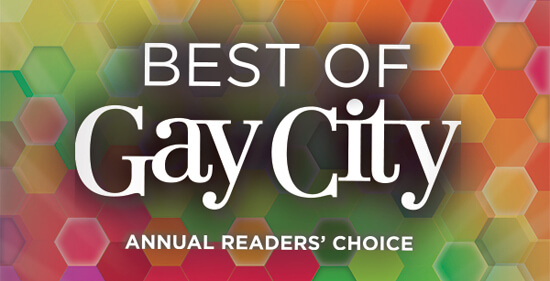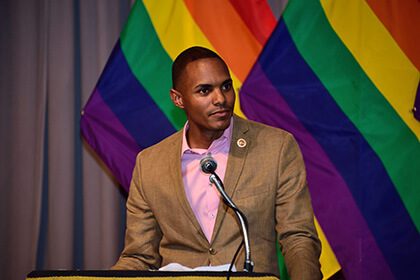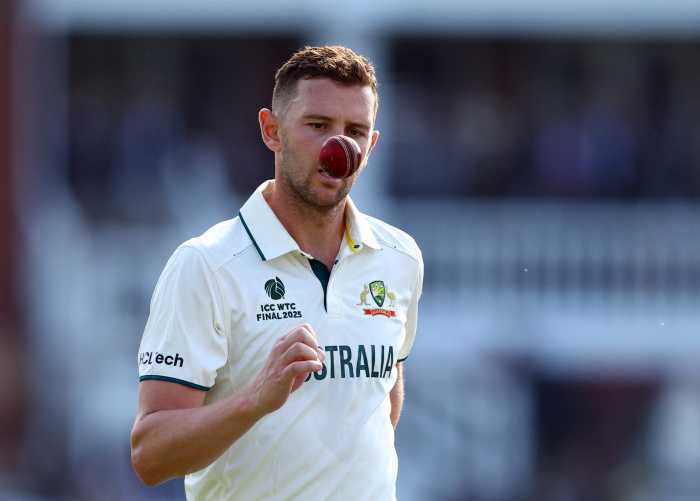August 11 was the night the lights went off at Splash. | MICHAEL LUONGO
“Who would build a bar here? It’s not the Village. It’s way up on 17th Street,” Harlem resident Lennie Harper, who went with friends to the opening night of Splash Bar during the summer of 1991, recalled thinking then. “We came in and we had a good time.”
Flash forward 22 years. Harper was on 17th Street again on Sunday, August 11, for Splash’s final night along with hundreds of others, capping off a week of closing events. “It’s the end of an era,” he said.
For Splash Bar, August 11 was the last dance, the last call
The 1980s migration of gays and lesbians into New York’s Chelsea neighborhood seeking cheaper rent than in rapidly gentrifying Greenwich Village, the center of New York gay life from at least the 1920s, wasn’t yet on the international radar. All that changed with Splash’s opening, an event many regard as Chelsea’s coming out as a gay neighborhood.
Splash owner Brian Landeche didn’t look at locating the bar in Chelsea in response to any transformation going on there. At the time, he said, “the Village was where gay life happened to be. Seventeenth Street was the closest thing we could find to the Village with a large floor. You had to be spectacular to draw people there, and we worked our butts off to make sure that happened.”
Landeche added Splash’s debut came before Sixth Avenue’s Ladies Mile renovations, when turn of the last-century department stores were converted into big box retail, marking Chelsea’s mainstream gentrification. He won’t argue Splash necessarily led to the neighborhood’s changes, saying only, “There were trends that followed. Whether we sparked them or were part of them is hard to say.”
Lady DJing on Splash's last night. | MICHAEL LUONGO
On the last night, Lady Bunny spun classics from the 1970s and 1980s, with DJ Alex Rodriguez following after her. Hundreds of men and a scattering of women came to hear them spin and to enjoy their own last dance. Landeche, wearing all white, stayed at the front bar, observing his iconic space — quiet, aloof, pensive, and perhaps a little sad.
“New York City is about change and evolving,” he said. “Chelsea matured and evolved, even after being on the frontier of things. Hell’s Kitchen is evolving, and XL made Hell’s Kitchen a destination, like we did for Chelsea over 20 years ago.” (Early last year, John Blair reopened XL, his onetime Chelsea nightclub, at the Out NYC Hotel on West 42nd Street.)
Landeche voiced no regrets about Splash’s closing, calling his time with the club “a privilege” that offered a counterpoint to the difficulties gay men in New York were facing in the early 1990s.
“In those days to have a place like this, when HIV was at its raging worst,” he said, “we could offer a place where guys could come and relax, a refuge where kids could come and dance. It made Splash a wonderful privilege for me.”
It is his employees, Landeche said, he will miss the most.
“We encouraged them to have an education, get a sideline career, open a business,” he said. “I knew for them this would not last. I wouldn’t give them off if it was about going to a circuit party, but if it was about classes, we would work with them. I am very proud of that.”
Among those who once worked there was nightlife impresario Mark Nelson, who managed Splash in the 1990s and considers Landeche a mentor.
“Splash will always be the place I considered a home,” Nelson said. “Many long term friends and many, many tricks. I was lucky to have learned from Brian and subsequently have had the career thus far with those good and bad lessons.”
Bartender Frankie Steele seems to be enjoying his last shift on 17th Street. | MICHAEL LUONGO
Another long time employee, Victor Daniel, said he had good memories over his 18 years of working at Splash. Now running his own company, the dating service Elite Mate, he decided to return for the last week, donning go-go shorts with his name emblazoned across his backside.
“I know a lot of people here,” he said from his perch in the downstairs bar. “It’s a little sad.”
Melancholy and nostalgia were also on the mind of Patrick Cashen that night.
“It’s sad to see it close. It’s like an institution for me,” he said, explaining he had lived in New York for many years, then moved elsewhere before returning. A resident of Sutton Place, Cashen added, “It opened in the early 1990s, which were my golden years. It’s amazing it lasted 22 years.”
When he heard the bar was closing, he knew he had to attend, visiting with friends after a long absence.
Willie Fernandez celebrates his 50th birthday on the last night of Splash. | MICHAEL LUONGO
Wearing an intense smile and a brilliantly colored shirt with a small stuffed animal around his neck, Willie Ferndandez looked at the evening as a celebratory one.
“I opened this club with a birthday and I am closing it tonight on my birthday” — his 50th, he said. “I am also HIV-positive and so it is an anniversary too for me to be here so long.”
Chris Olin, from the Bronx, also took a long view of Splash’s run.
“This was one of my bars when I came out, so to be here on closing night is legendary for me,” he said. A regular attendee over the years, Olin said it was important for him to hear the final “last call for alcohol,” closing down the night.
The evening might have been a special one, but it looked just like so many others. The giant disco ball spun from above the dance floor, reflecting diamonds of multicolored light over the revelers, go-go boys towering over them from the bar and scattered platforms. Many of the men were dancing shirtless in the summer heat, continuing the decades-long ritual gay urbanites are famous for.
Among them was Ethan Bedell, a swim coach who lives in Brooklyn. He said of Splash, “It’s magical. It’s an institution like Studio 54. It’s the lifeblood of New York City, of gay New York City.” Unlike many others there that night, Bedell was too young to remember when Splash opened. He voiced optimism that life would go on for New York’s gay scene, saying, “I’m looking forward to continuing the Splash legend after tonight though, because everyone loves this, and Dougie Meyer is moving the party to XL.”
Meyer, Splash’s promoter, who accepted a position at the 42nd Street club as promotional director, was due to hold his first party there the following evening.
While many at Splash’s last night recalled the glitzy, golden moments it made possible, Allen Roskoff, a longtime activist who heads the Jim Owles Liberal Democratic Club, focused on many of the struggles faced by the bar and Landeche.
The splendor of a giant disco ball and go-go boys on the bars were staples of Splash for 22 years. | MICHAEL LUONGO
“It’s an icon and an institution with an incredible history, and it’s a damn shame it’s closing,” he said. “They suffered vast amounts of harassment from the police and got no help from their City Council.” Calling Splash “the country’s most famous gay bar,” he charged that Speaker Christine Quinn, a leading mayoral hopeful, “did nothing to help something that was important to her constituencies.”
Landeche himself, however, did not bring up such hurdles.
“This is bittersweet,” he said, looking back over the last 22 years. “Everything has its time, though. Splash was a party and it was time to leave the party.”
He did not say what would be next for him, but now that Splash is closed, Landeche did mention one thing he is looking forward to.
“I’m going to get eight hours of sleep every night,” he said.







































